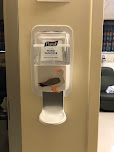But how could I say that I will be happy to see 2020 fade into the past when it was also the year that we achieved the Malcolm Baldrige National Quality Award?
All my GBMC colleagues have been phenomenal in this year! Our clinicians stood up to the pandemic day after day and our support staff did everything they could to make it easier to get the job done despite the coronavirus. And, as if that were not enough, when criminals brought down all our computer systems, we pivoted hundreds of processes in order to treat every patient the way we would want our own loved ones to be treated. Our IT professionals then began the monumental task of rebuilding all those systems.
I will always remember the tenacity, dedication, and tireless work of our staff members who helped us get through two huge challenges simultaneously.
As the year is coming to an end, the number of people hospitalized in Maryland with COVID-19 has again plateaued, and we have begun vaccinating healthcare workers – there is light at the end of the tunnel in the battle against the pandemic. We have also begun to bring our systems back online. We are hopeful that the end of the computer downtime is also in sight.
I would like to remind everyone that, in addition to the achievement of the Baldrige award, there were many other good things that happened within our system in 2020. Some of these were:
• Our Marketing and Communications team positioned GBMC as the “trusted healthcare communicator.” In addition to being prominently featured on television, radio, and social media to educate the community about the pandemic. As an example of this, I had the honor of serving as the host for a virtual question and answer session with Dr. Anthony Fauci, Director of the National Institute of Allergy and Infectious Diseases (NIAID), and member of the White House Coronavirus Task Force. This was a unique opportunity to discuss COVID-19, our healthcare system, and our response to the global pandemic with a world leader in infectious diseases.
• We received approval of our Certificate of Need (CON) for a three-story hospital addition known as The Promise Project. We are on schedule to break ground late next summer.
• We opened our new advanced primary care site – GBMC Health Partners at Padonia. The practice serves the entire family, from newborns to elders, and is staffed with a team of physicians, advanced practitioners, nurse care managers, care coordinators, and support staff.
• The Gilchrist Center Baltimore broke ground on a new inpatient hospice center at Stadium Place in November. The new center will continue to be the only residential hospice in Baltimore and will house the only pediatric inpatient hospice unit in the state. The addition of Gilchrist’s inpatient hospice will give Stadium Place the full continuum of care for elders.
• We earned a five-star rating from the Centers for Medicare and Medicaid Services' (CMS) Hospital Compare Program. We are one of only a few hospitals in the state to achieve the highest score! CMS created the star-rating system to give patients the tools they need to find the organizations that will provide the highest value to them.
• GBMC was the first hospital in the state to earn the Joint Commission Advanced Certification in Perinatal Care! This certification means that patients can expect integrated, coordinated, patient-centered care through pregnancy and childbirth.
• Our Primary Stroke Center was selected for the 2020 American Heart Association’s (AHA) Get With The Guidelines® (GWTG)-Stroke: Gold Plus with Target: Stroke Elite Honor Roll and Target: Type 2 Diabetes Honor Roll. The award recognizes hospitals that meet specific quality measures for the diagnosis and treatment of stroke patients.
• Our Sexual Assault Forensic Examination and Domestic Violence Program (SAFE/DV) officially opened its new 2,500-square-foot location to help care for the growing number of victims of sexual assault and domestic violence.
• GBMC received the highest award of Summa Cum Laude in Epic’s Honor Roll Good Maintenance Grant Program. This is the highest level of achievement for Epic users! We were also a recipient of the Most Wired Hospital award from the College of Healthcare Information Management Executives (CHIME) for both our acute and ambulatory services. We were one of a few hospitals in the state to receive two Level 9 Most Wired recognitions. Many institutions have only been successful on the acute discipline.
• Our Lymphedema Center was awarded the LE&RN (Lymphedema Education & Research Network) classification of Network of Excellence in Lymphatic Disease. The goal of the LE&RN Centers of Excellence program is to increase access to the best possible multi-disciplinary care for individuals with lymphatic diseases (LD) and their families through a geographically diverse network of clinical centers.
• Our Sandra and Malcolm Berman Cancer Institute achieved QOPI® Re-Certification, Quality Oncology Practice Initiative (QOPI®) status. This reflects our ongoing commitment to quality of care that leads to fundamental changes in the clinical practice of oncology. QOPI®, a program of the American Society of Clinical Oncology, is a three-year certification for outpatient hematology-oncology practices.
• Our Cancer Institute was also recognized as a “high-performing site” by the National Cancer Institute (NCI) for the second year in a row. The NCI’s High-Performing Site Initiative recognizes institutions that enroll many patients in the National Clinical Trials Network and demonstrate scientific leadership in the design and conduct of clinical trials. I also want to congratulate our Cancer Institute for opening a satellite location in Owings Mills.
I am excited about returning to “normal” some-time in 2021. We will continue to focus on our vision of being the community-based system of care that the patient experiences as a system, and can deliver the care we want for our own loved ones to every patient, every time. We have done very, very well during the pandemic and the cyberattack, but these have been unwanted distractions. In 2021, we will build on our achievement of the Baldrige award to move even faster towards our vision. I am also excited about working with others to invest in the Baltimore community and deliver on our vision to neighborhoods that are presently being left behind.
I want to thank all of Team GBMC, whether they are in Gilchrist, GBMC Health Partners, or Greater Baltimore Medical Center for everything they have done in 2020! I love to work with every one of you and I am in awe of what you have accomplished against all odds. So, although we can’t have a big celebration (yet), let’s raise a glass and say goodbye to 2020 as we welcome 2021!
































